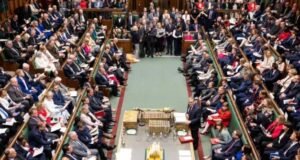Internet and communications companies will be required to store details of people’s web usage for up to a year under new spying laws revealed by Home Secretary, Theresa May.
Mrs May addressed MPs on Wednesday by presenting the draft Investigatory Powers Bill that will monitor communications between citizens.
In 2012, Ms May presented a similar bill, nicknamed the Snoopers Charter, that was blocked by Liberal Democrats because of their concerns for the bill’s strict measures.
But she made it clear that the new Bill is not a return to the draft communications bill of 2012. She said that the government consulted technical experts, academics and charities representing victims before bringing the draft legislation to Parliament today.
And like the 2012 plans, the new draft Bill is controversial because of its powers to intercept people’s electronic communications.
She said: “We live in a digital age and technology is having a profound affect on our lives…but the digital society also presents us with challenges…There have been six significant terrorist attacks in the UK alone.”
Mrs May added: “Those in charge of protecting us must have the power to do so.”
The key points of the Bill:
• Requires internet and phone companies to store records of websites visited by every citizen for 12 months for access by police and security services
• Will make explicit provisions for law enforcement and security agencies to acquire data in bulk
• Security services and police will have the power to hack and bug into computers and phones and the Bill places new legal obligation on companies to assist in these operations to bypass encryption
• Double-lock on ministerial authorisation of intercept warrants with panel of seven judicial commissioners given power of veto, but exemptions are allowed in urgent cases of up to five days
• Existing system of three oversight commissioners replaced with a senior judge
• Prime minister to be consulted in all cases involving interception of MPs’ communications
Because so much communication is now done online and across new platforms police and security agencies feel that they need to improve their ability to track terrorists and criminals.
However, privacy and civil liberty campaigners argue the bill needs to open a debate about the appropriate level of snooping powers in to private lives.
Due to the increase in online crime, the Government sees such a Bill necessary for the police and security service to be bound under one umbrella law because the current legislation is made up of several laws that are confusing and complex.
When speaking about the access to websites that people browse, Ms May said police and security agencies won’t be allowed to see the individual pages on a website – only the website itself – and it will be “the modern equivalent of an itemized phone bill”.
Andy Burnham, Labour’s shadow home secretary, says Theresa May has “broadly” got the balance right with the draft Investigatory Powers Bill. He says she has “responded to legitimate concerns and broadly got that balance right”.
Under the proposed Bill, internet and communication companies will be required to store people’s web and social media data for 12 months.
Police and security services will also have access to the data, which includes all the websites a person visits, but not the individual pages within that site, unless they have a warrant.
Nick Clegg, the former Liberal Democrat leader also said that the new Bill is “much improved”. But he warned that “under the bonnet” he suspects it contains the “flaws of its predecessor”, the 2012 bill.
Mrs May responded by saying, “some of the more contentious” elements of the previous Bill no longer appear. She said the double-lock would provide “public accountability”.
 Weekly Bangla Mirror | Bangla Mirror, Bangladeshi news in UK, bangla mirror news
Weekly Bangla Mirror | Bangla Mirror, Bangladeshi news in UK, bangla mirror news








